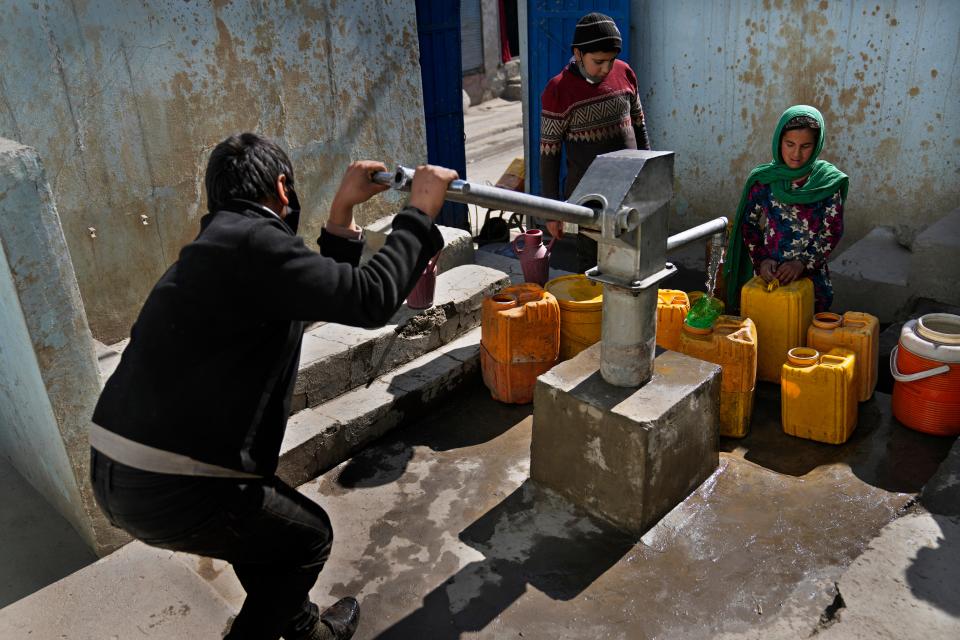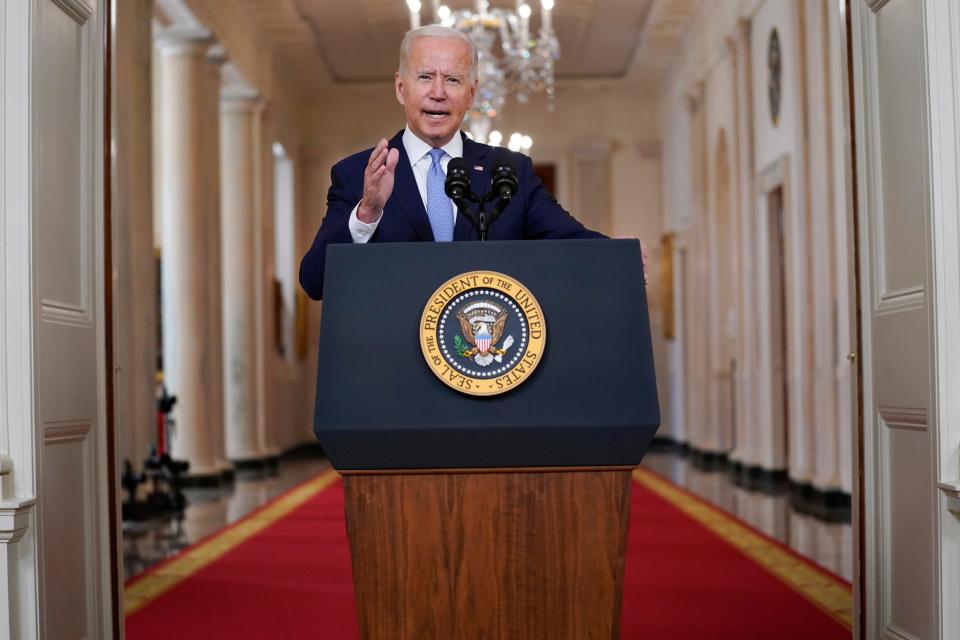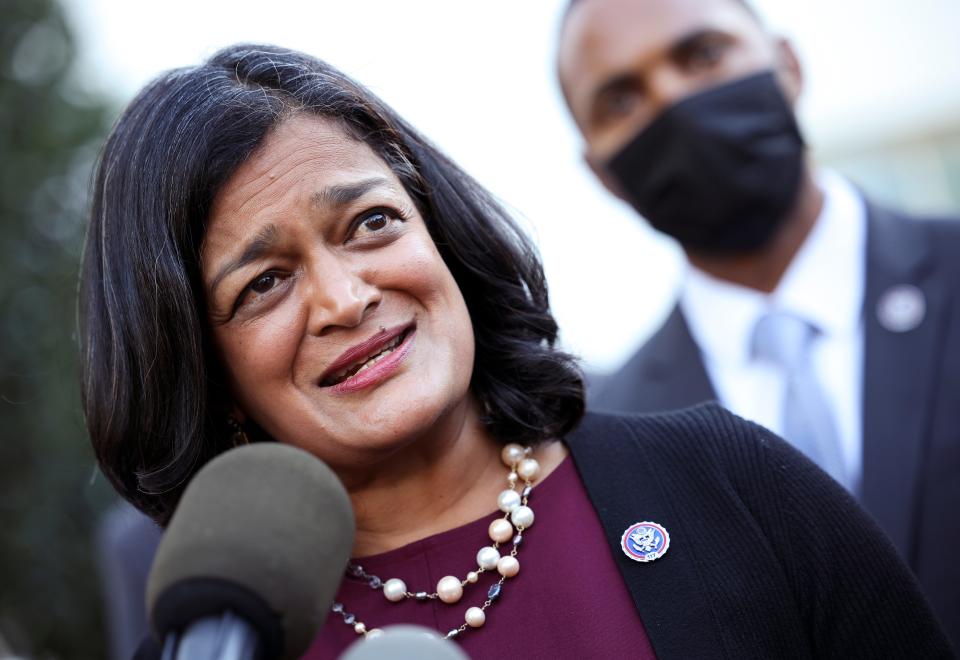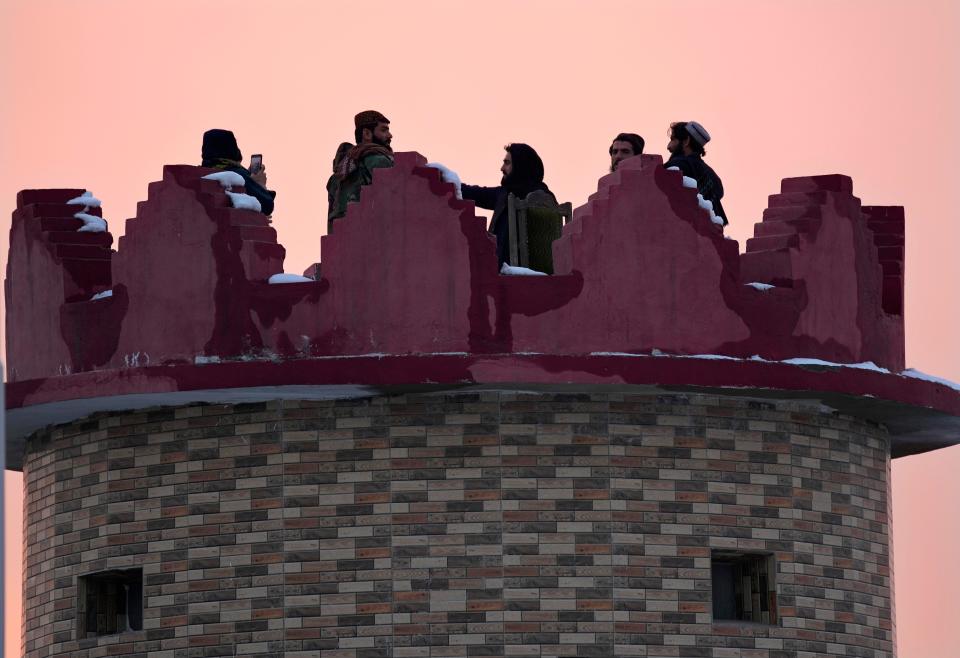Biden's 'betrayal': Backlash erupts on plan to split Afghanistan's frozen assets with 9/11 victims
- Oops!Something went wrong.Please try again later.
WASHINGTON — President Joe Biden's plan to split $7 billion in frozen assets from Afghanistan's central bank to benefit relatives of 9/11 victims has sparked a fierce pushback from Washington to Kabul.
Afghans say the move is a devastating blow to a country already in an economic and humanitarian tailspin, an argument echoed by prominent members of Congress.
Lawmakers in both parties fear that Biden's plan – under which the U.S. would devote half the funds to humanitarian assistance for Afghanistan and half to the 9/11 families – could inadvertently prop up the Taliban if some of the funds are diverted to the group's coffers.
Meanwhile, some families of 9/11 victims worry they will get left out of the payout.
The resistance from multiple fronts presents fresh political blowback for Biden, six months after his administration's chaotic withdrawal from Afghanistan, which ended America's longest war after 20 years of occupation.
When Kabul fell to the Taliban last August, the disbanded Afghan government left behind about $9 billion in reserves in banks across several countries, the majority at the Federal Reserve Bank in New York. The U.S. froze the assets to try to keep it away from the Taliban after it seized power.
"This money belongs to Afghan people," said Palwasha Hassan, an Afghan national and visiting fellow at the Institute for Women Peace and Security at Georgetown University. She fears depleting the assets of Afghanistan's central bank, known as Da Afghanistan Bank – which supports the Afghan currency – will worsen Afghanistan's economic collapse.
"It's beyond words. It's a big-time betrayal and it hurts. We didn't really expect this to happen," she said.
More: Biden moves to split $7B in frozen Afghan funds for 9/11 victims, humanitarian aid
Biden signed an executive order Feb. 11 invoking emergency economic powers to consolidate the $7 billion held in the U.S. into an account at the Fed.
The president's action marked a first step to enable relatives of certain victims of the Sept. 11, 2001 terrorist attacks who won legal judgements against the Taliban nearly two decades ago to pursue $3.5 billion of the assets. The other $3.5 billion would be used for further humanitarian aid for Afghans as their country faces a crushed economy and widespread famine amid the return of the Taliban's brutal rule.

A senior Biden administration official, discussing the plan on the condition of anonymity before it was formally announced, said the deal "heeds bipartisan calls" to use the funds to address Afghanistan's growing humanitarian crisis.
But more than 125 Afghan women leaders have urged Biden to reconsider his decision, calling it "extremely unfair" and warning it will "drive Afghanistan's economy further into the ground." They made their plea in a letter to the president delivered last week.
"Taking the funds from the Afghan people," the Afghan women wrote, "is the unkindest and most inappropriate response for a country that is going through the worst humanitarian crisis in its history. It is the squeezing of a wounded hand."
'They are looking for us to kill us': In hiding from Taliban, Afghans who helped U.S. struggle to escape
The group, which included members of the Afghan Women's Network and the Afghan American Women Association, wrote that "while we share the sorrow of 9/11," the Al Qaeda terrorists who orchestrated the terrorist attacks were not Afghans. Fifteen of the 19 hijackers were Saudi nationals, as was Osama bin Laden, the founder of al-Qaida, the militant Islamic terrorist group that plotted and executed the attacks, which killed nearly 3,000 people.
The Taliban provided shelter to al-Qaida terrorists during the group's previous rule of the country. A team of U.S. Navy Seals later killed bin Laden during a raid in Pakistan.
'Paying for the crimes of other people'?
Mary Akrami, executive director with the Afghan Women’s Network, said it was "shocking" to learn of Biden's plans for the assets. She likened it to "a kind of punishment" for half the money to go to 9/11 victims and "not acceptable" to Afghans who have suffered so much.
"We have lost everything. We have lost our dignity. We have lost our country. This money belongs to the people of Afghanistan," Akrami said.
A humanitarian crisis has engulfed Afghanistan since the fall of Kabul, with 24 million Afghans in need of humanitarian assistance, according to a new United Nations report.
Hassan, who fled her homeland last year along with thousands of other U.S.-allied Afghans, said parents in Afghanistan have reverted to selling one child to feed another.
"How come we are paying for the crime of other people?" Hassan said.
'Crisis response': Afghans stuck in NJ hotels and Airbnb as resettlement overwhelms system

The Biden administration has defended plans to divert the funds. White House press secretary Jen Psaki said Biden took the step "in effort to try to provide some of this funding to the Afghan people." Without any action, she said, the money would be just sitting in the bank.
Which 9/11 families will benefit?
Yet it is dividing the funds for relatives of 9/11 victims that has raised the most eyebrows.
About 150 relatives of 9/11 victims sued a list of targets, including the Taliban and al-Qaida, nearly 20 years ago for their roles in the terrorist attacks. Although a court found the defendants liable, there was no mechanism to force them to pay damages. After the Taliban regained control of Afghanistan in August, the 9/11 victims' relatives argued they were entitled to funds kept in the central bank.
Biden's 9/11 settlement: A nightmare families never wanted to face | Mike Kelly
The 9/11 family members are represented by a high-powered legal team including Lee Wolosky, who returned to private practice after working in the White House last fall to coordinate legal efforts to resettle Afghan evacuees. The Intercept first reported the involvement of Wolosky, who led former President Barack Obama's efforts to shut down Guantanamo Bay.
Wolosky and other members of the legal team working for relatives of 9/11 victims did not return messages seeking comment.
Attorneys representing other 9/11 family members have criticized the plan, noting that only a fraction of the thousands of 9/11 victims and relatives would be compensated and arguing their clients should receive a portion as well.
"To avoid a situation that would value some victims’ lives over others, we believe any funds that the court designates for the 9/11 families should be distributed equitably and in a transparent and fair manner," the law firm of James Kreindler, one of those attorneys, said in a statement.
Progressives, conservatives oppose Biden's plan
Afghans who oppose the plans have an ally in the left-leaning Progressive Caucus, made up of 95 House Democrats, which came out against splitting the funds last week. In a statement, the caucus said "any functioning country must have access to its own currency and reserves." And while members said they agreed there's a need for robust humanitarian aid, they said it "cannot substitute" for a functioning central bank.
The release of the funds is critical to restoring the stability of Afghanistan's economy and a moral responsibility for the United States, Rep. Pramila Jayapal, D-Wash., said in an interview with USA TODAY.
"We've left the country, and I think we need to not just pull our troops out but we also need to turn the resources back to the Afghani people," she said.

Jayapal said money for families of 9/11 victims should come from a separate fund. "This should never be framed as not wanting restitution to go to the 9/11 families. Of course we want that."
'I stand squarely behind my decision': Biden defends handling of Afghanistan as Taliban forces seize Kabul

The $3.5 billion in humanitarian aid is in addition to existing U.S. assistance to Afghanistan, including $516 million since mid-August. But some members of Congress have raised concerns that the Taliban could seize control of money intended to help suffering Afghans.
During a Senate committee hearing last week, Sen. Todd Young, R-Ind., said the "worst-case scenario" for Afghans would be "would be if humanitarian aid were diverted from legitimate recipients towards the Taliban and its partners in terror."
Media in Afghanistan: Journalists and Afghan nationals detained in Kabul released
In a statement to USA TODAY, Young said the humanitarian crisis under Taliban is "heartbreaking" but the central bank's reserves "are not the place or means to provide the aid."
He also said Biden's arrangement "essentially caps" what 9/11 victims and their families are entitled to receive.
A senior Biden administration official said the White House will ensure "appropriate controls" to protect the humanitarian aid from going directly to the Taliban and potential illicit activity, but the official did not elaborate.
The transfer of the funds could still be several months away. A federal court in New York will have to first rule on the scope of claims made by 9/11 victims for their compensation and the court must authorize the use of other funds to benefit the Afghan people.
But Congress is not required to sign off on the funds, leaving Afghans no path to halt the plans other than a change of heart from Biden.
"There should be some formal discussion about this," Akrami said, "and Afghans should be involved."
Reach Joey Garrison on Twitter @joeygarrison.
This article originally appeared on USA TODAY: Biden's plan to split $7B with 9/11 victims slammed by Afghans

